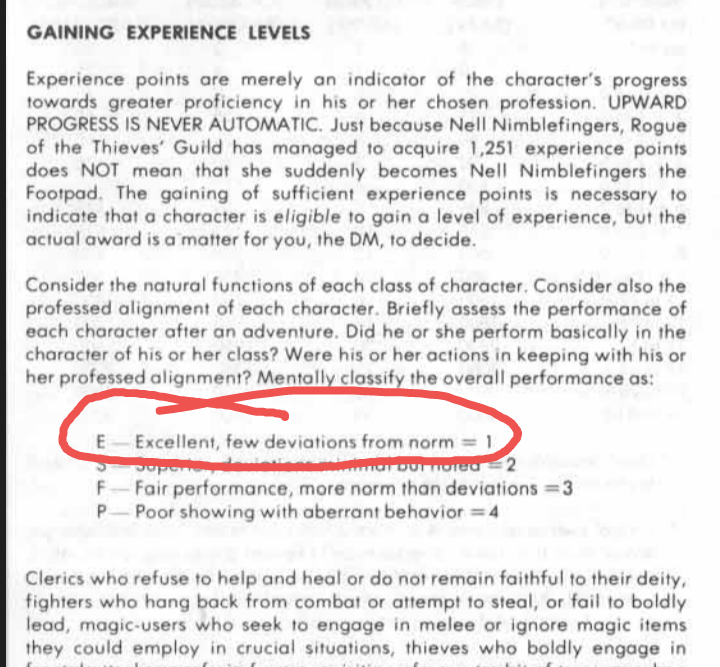Character advancement in Advanced Dungeons & Dragons 1st Edition (AD&D1e) has details that have been overlooked for decades.

The Referee is expected to grade the performance of each participating character. When that character earns enough Experience Points (XP), he qualifies to gain a level. It is not automatic. THERE IS NO "DING!"
The above is from page 86 of the Dungeon Master's Guide. On that same page (clipped above) is that performance grading takes into account the expected role and behavior of the character's class. Clerics have their expectations, Fighters theirs, and so on.
In the Player's Handbook it is explained that demi-human characters may multi-class, and that each class must be developed independently. (pp.32-33) That not only means that a demi-human must level up each of their classes independently, but also that they are expected to conform to the behavior and fulfill the role required of each class.
Poor performance grading means that when that character qualifies to level up, the costs in time spent locked into Downtime (and thus gold spent) due to training go up.
At the table, the Fighter/Thief (for example) has conflicting expectations to manage; during a fight he is expected to engage the enemy (Fighter) but also to avoid risk in favor of exploiting opportunities (Thief). The Fighter/Magic-User has similar conflicting expectations; to engage and to stay back and use magic. Other combinations have similar conflicts to resolve.
To avoid poor grading on all of his classes, the player of a multi-classed character must master the challenge of managing these conflicts. The player should, from the start, see to equipping and running his demi-human character with this foremost in mind. Training costs are not cheap (ibid) and characters are not unlimited in gold or time, so having to spend more than is necessary is a bad play no matter what.
This matters a lot more than it seems. Sure, you're playing a three-way multi-classed character. Your man also suffer three times the Training costs to level up, as each time your man does he is out of action for at least one week and spends considerable sums to do so. If he cannot train locally, then add on the time to either self-train (if allowed) or to travel to where he can train and come back. This adds up.
Meanwhile, your single-classed counterparts are not only reaching higher levels of power (and other benefits) sooner but also with less downtime and gold spent doing so- and with an easier time playing their character at the time. While you're celebrating getting all three of your man's classes to 3rd level, Bob's Thief is well into 5th and likely to hit 6th before long.
You, playing a multi-classed demi-human, are choosing to play a character whose power grows much slower than a single-classed character. You choose to play a character that has to juggle conflicting priorities or be forced to develop even slower than is already the case, and thus is incentivized to seek ways to resolve those conflicting priorities through leaning hard on what synergies exist between those classes- and that is a long-winded way of saying "defining a niche and specializing in it".
"But Dual-Class-"
The Dual-Class character plays one class at a time, switching wholly from one to the other. (Yes, this includes Bards.) Eventually his second class surpasses the first and he is freely able to use both class's features, but he is still only of one class at a time and thus only subject to the active class's standards.
Keep this in mind when you roll up your next man, and definitely do when you get behind the screen. There needs to be reasons to opt against being multi-classed; now we can see the whole of what that cost is, and it's long past time to make those costs felt at the table and during the downtime of campaign play.
No comments:
Post a Comment
Anonymous comments are banned. Pick a name, and "Unknown" (et. al.) doesn't count.